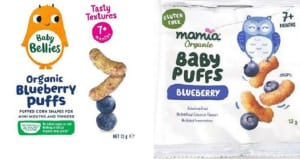
Used under a Creative Commons Licence
When House Brands Cross the Line: Aldi Breached Copyright
Supermarket giant Aldi, renowned for its “like brands, only cheaper” ethos, has been ordered to pay damages for copyright infringement in a case that highlights the thin line between inspiration and imitation.
The Federal Court found Aldi had flagrantly breached copyright in its packaging for Mamia Baby Puffs, ruling in favour of Little Bellies, a children’s snack food brand owned by Hampden Holdings.
Justice Mark Moshinsky didn’t mince words: Aldi deliberately used the Baby Bellies designs as a “benchmark” to develop its own packaging, crossing the threshold of what copyright law permits.
While imitation is often seen as flattery in the business world, this case proves it can also be very costly.

The Case in Detail
The Federal Court ruling, which covers three out of 11 challenged products, focused on Aldi’s Baby Puffs packaging. The court found that Aldi’s design team, Motor Design, copied key elements from Little Bellies’ packaging, including:
- An oval-shaped cartoon character with a prominent belly.
- A rounded, childlike font.
- A vertical arrangement of ingredient images.
The evidence was damning. Emails showed Aldi’s buying director explicitly referencing Little Bellies as a “benchmark,” instructing Motor Design to replicate elements of the brand’s packaging. Further emails revealed discussions about tweaking the design just enough to avoid legal trouble. Justice Moshinsky, however, was unconvinced by Aldi’s attempts to justify its process.
“Aldi sought to use for its own commercial advantage the designs that had been developed by a trade rival. Although Aldi may have intended to avoid infringement, it took the risk that its use of the Bellies designs would exceed what the law allows. I consider Aldi’s conduct to be flagrant.”
Adding to Aldi’s woes, the court noted that the supermarket continued selling the infringing products for months after receiving a letter of demand from Hampden Holdings.
Copyright vs. “Look and Feel”
Aldi argued that Hampden Holdings was claiming protection for the “look and feel” of its packaging rather than specific artistic works. Justice Moshinsky disagreed, finding that copyright law protects the tangible expression of ideas—like the specific designs and layout elements of the packaging—not abstract concepts.
The court further ruled that Aldi’s non-puff products did not infringe copyright, as the similarities were too minimal to constitute substantial copying. This distinction reinforces that copyright infringement is a qualitative judgment, not a quantitative one.
A Landmark for Packaging Design
This case sets a powerful precedent for brands concerned about copycat packaging. While previous claims against Aldi, such as the Moroccanoil case, have failed under misleading and deceptive conduct laws, this ruling highlights the value of copyright as a tool for protecting packaging designs.
Lessons for Brands
- Copyright is a Powerful Shield
- Artistic works embedded in packaging, such as characters, fonts, and layouts, are protectable under copyright law.
Be Careful with “Benchmarks”
Referencing competitors’ designs during the creative process can expose a company to significant legal risks.
Flagrant Conduct Costs More
The court’s consideration of additional damages underscores the financial risk of ignoring cease-and-desist notices.
Aldi’s Legal Battles in Australia: A Snapshot
Aldi’s approach to private-label branding has often sparked controversy. Many brands accusing the supermarket giant of copying their designs. Some cases have gone to court with varying degrees of success, while others remained media discussions.
Aldi’s IP Controversies: Wins, Losses, and Media Highlights
Here are some notable examples:
Hampden Holdings (Little Bellies) vs Aldi (2024)
Issue: Copyright infringement of Baby Bellies packaging.
Outcome: Aldi found liable for copying packaging designs, marking the first successful copyright infringement case against Aldi in Australia.
Moroccanoil Israel Ltd vs Aldi (2018)
Issue: Claims of misleading and deceptive conduct for Aldi’s imitation hair products.
Outcome: Aldi won the case after successfully arguing that its products were not deceptively similar.
Frito-Lay vs Aldi
Issue: Allegations that Aldi’s “Cheezy Twists” name was too similar to “Twisties.”
Outcome: The court ruled in Aldi’s favour, finding no deceptive similarity.
Allegation: Similarities between Aldi’s chocolate packaging and Cadbury’s iconic designs.
Discussion: The media highlighted the resemblance, but no formal legal action was pursued.
Arnott’s Shapes vs Aldi Snack Crackers
Allegation: Aldi’s snack crackers were considered by some to mimic the look and feel of Arnott’s Shapes.
Discussion: The similarities made headlines, but the case never escalated to court.
Aldi’s business model of creating private-label products resembling leading brands frequently places it in the crosshairs of legal challenges. Historically, Aldi has successfully defended claims of trade mark infringement and misleading conduct in Australia. The Little Bellies case, however, marks a turning point by establishing copyright law as a robust avenue for brand protection.
Please note the above article is general in nature and does not constitute legal advice.
Please email us info@iplegal.com.au if you need legal advice about your brand or another legal matter in this area generally.


